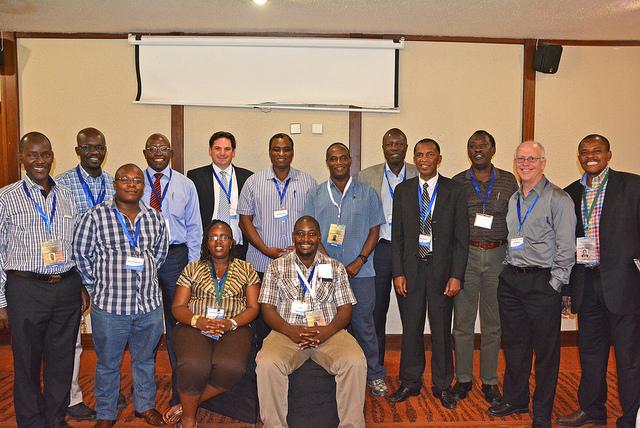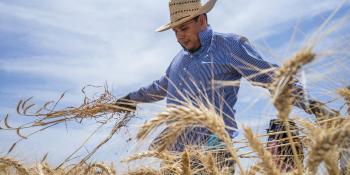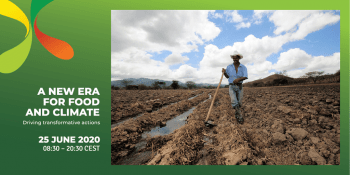Coordinating climate services with key institutions in Africa

Strengthening climate services in Africa entails developing capacity of agencies to produce and communicate farmer-relevant climate information.
Key institutions working on climate services in Africa have embarked on a collective process towards strengthening and scaling up climate information and advisory services for agriculture in Africa. Researchers and technical experts from these institutions met during a pre-event to the fifth conference on Climate Change and Development in Africa (CCDA-V) in Victoria Falls, Zimbabwe held from 28 to 30 October 2015. CCDA is an annual forum, convened by the African Climate Policy Center (ACPC), designed to strengthen linkages between climate science and development policy by promoting transparent discussions between key stakeholders in the climate and development communities.
The pre-event, held on 27 October, brought together researchers from the CGIAR Research Program on Climate Change, Agriculture and Food Security (CCAFS), representatives from national meteorological and hydrological services (NMHS), the IGAD Climate Predictions and Applications Centre (ICPAC), the ClimDev-Africa program, the Global Framework for Climate Services (GFCS) and the International Research Institute for Climate and Society (IRI). The discussions were an important step toward a collaborative effort to strengthen capacity, through African regional institutions, to support smallholder farmers with relevant climate services. Key messages from the discussion were presented to other participants during the closing plenary of the CCDA conference and will inform meeting outcomes.
Gaps in design, delivery and effective use of climate services for smallholder farmers at scale
Participants highlighted two major gaps: limited capacity of meteorological organizations to provide farmer-relevant climate information and to communicate it in a manner that smallholder farmers can use effectively.
The capacity of our meteorological services to handle processes such as monitoring, transmission, analysis and dissemination of climate information to end users needs strengthening.
“The capacity of our meteorological services to handle processes such as monitoring, transmission, analysis and dissemination of climate information to the end users such as farmers needs strengthening,” noted Didace Musoni from the Rwanda Meteorological Agency (RMA) during the meeting. He emphasized the need for climate scientists to work in a more coordinated way with national institutions.
While agricultural extension services and some development organizations have more capacity to reach smallholder farmers, they generally lack the expertise to enable farmers understand and use complex climate-related information. Many countries also lack effective mechanisms to allow meteorological and agricultural agencies to work effectively in the design and delivery of effective climate services for farmers.

Participants from regional institutions who attended the pre-event, thereby, contributing to the rich discussions. Photo: V. Atakos
Lessons from collective experiences on how key gaps can be addressed
Workshop presentations described initiatives that have developed promising solutions to the key challenges faced by national institutions.
The Enhancing National Climate Services (ENACTS) initiative, for instance, focuses on the creation and communication of spatially complete, high-resolution climate information products that can be tailored to the needs of local decision-makers. “ENACTS strives to simultaneously improve availability, access and use of climate services,” said Tufa Dinku, from IRI who works on the project. Data availability is improved by blending national observations with satellite and other proxies. Access to information products is improved by providing online tools for data analysis, visualization and download. These online tools are integrated into the NMHS’ web pages.
ENACTS has so far been implemented in eight countries in Africa (Ethiopia, Gambia, Ghana, Mali, Madagascar, Rwanda, Tanzania and Zambia). Rwanda has benefited by being able to fill in the gaps in their climate data for the period 1994 to 2004 (genocide period).
Read more about ENACTS: Involving users in the creation of climate information products.
Participatory Integrated Climate Services for Agriculture (PICSA), undertaken by CCAFS and the University of Reading, is one of the initiatives that aim to strengthen capacity of agricultural extension services and other intermediaries to communicate climate services with smallholder farming communities. PICSA involves farmers in using historic weather data and forecasts for their planning. PICSA has been piloted in Tanzania, Malawi, Zimbabwe, Ghana and Kenya. A PICSA manual for intermediaries was launched on 28 October. (Download manual - PDF).
“The PICSA approach depends on products from analyzed historical climate information which is not routinely available. Its success, in whatever context, therefore depends on strengthening the capacity of the national meteorological services to produce and share relevant climate information products,” said John Gathenya who has worked with PICSA in Tanzania and Malawi.
CCAFS strategy for climate services in the region entails working with key regional and national institutions to address gaps in design, delivery and effective use of climate services for smallholder farmers at scale hence involvement in ENACTS and PICSA.
Access presentation on CCAFS Strategy for climate services on slideshare.
Collective process toward strengthening climate services for agriculture in Africa
Participants highlighted the need to coordinate efforts to develop capacity to produce farmer-relevant climate information, and to develop capacity to communicate that information.
The challenge of coordinating development of capacity of NMHS to supply relevant climate information, and capacity of agricultural intermediary organizations to communicate climate services, raised the importance of coordinating financial investments in climate services. Coordination among funders is important, to ensure that support targets the critical gaps in a given context, and to avoid duplication of initiatives by different players.
To better target investments, an inventory of what has already been invested in a certain area of climate services — for instance tools or training in a particular approach— will need to be established. Additionally, governments need to elevate discussions on the role of climate services in agriculture in order to increase investment opportunities by funding agencies.
View photos from the meeting:
Additional Information
Read more about PICSA:
New manual helps expand reach of climate services together with farmers
Access all presentations from this meeting:
Blog written by Vivian Atakos (Communications Specialist for CCAFS East Africa) with contributions from Jim Hansen (Leader, CCAFS FP2) and Catherine Mungai (Partnerships and Policy Specialist, CCAFS East Africa).



